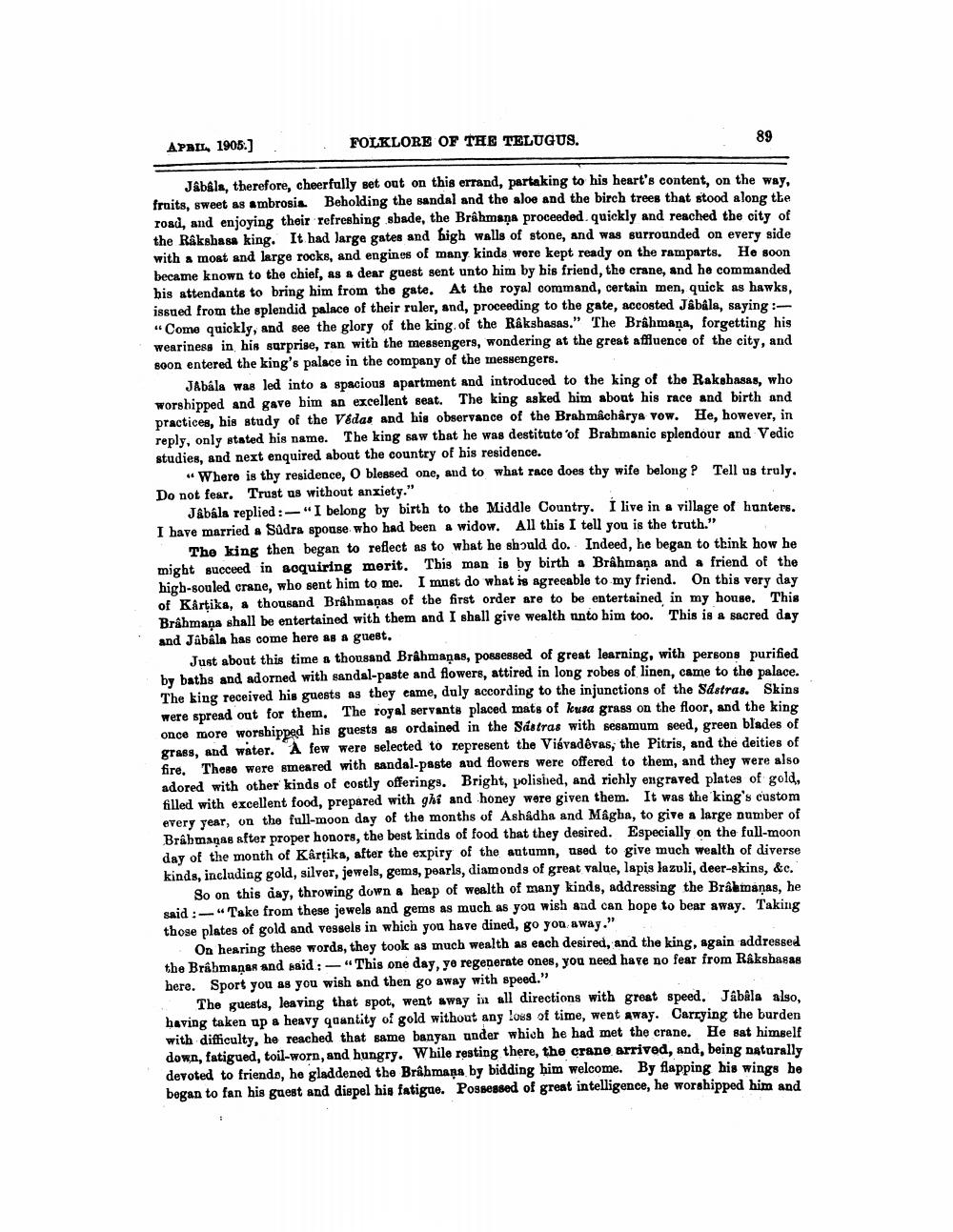________________
APRIL 1905.)
FOLKLORE OF THE TELUGUS.
Jabala, therefore, cheerfully set out on this errand, partaking to his heart's content, on the way, fruits, sweet as ambrosis. Beholding the sandal and the aloe and the birch trees that stood along the road, and enjoying their refreshing sbade, the Brâhmaņa proceeded quickly and reached the city of the Rakshasa king. It had large gates and high walls of stone, and was surrounded on every side with a moat and large rocks, and engines of many kinds wore kept ready on the ramparts. He soon became known to the chief, as a dear guest sent unto him by bis friend, the crane, and he commanded bis attendants to bring him from the gate. At the royal command, certain men, quick as hawks, issued from the splendid palace of their ruler, and, proceeding to the gate, accosted Jabala, saying:"Come quickly, and see the glory of the king of the Rakshasas." The Brahmana, forgetting his weariness in his surprise, ran with the messengers, wondering at the great affluence of the city, and soon entered the king's palace in the company of the messengers.
JAbála was led into a spacious apartment and introduced to the king of the Rakshasas, who worshipped and gave him an excellent seat. The king asked him about his race and birth and practices, his study of the Vedas and his observance of the Brahmâchârys vow. He, however, in reply, only stated his name. The king saw that he was destitute of Brahmanic splendour and Vedic studies, and next enquired about the country of his residence.
Where is thy residence, O blessed one, and to what race does thy wife belong? Tell us truly, Do not fear. Trust us without anxiety."
Jabals replied: -"I belong by birth to the Middle Country. I live in a village of hunters. I have married a Sudra spouse who had been a widow. All this I tell you is the truth."
The king then began to reflect as to what he should do. Indeed, he began to think how he might succeed in aoquiring merit. This man is by birth a Brahmaņa and a friend of the high-souled crane, who sent him to me. I must do what is agreeable to my friend. On this very day of Kårţika, a thousand Brahmaņas of the first order are to be entertained in my house. This Brahmana shall be entertained with them and I shall give wealth anto him too. This is a sacred day and Jabala has come here as a guest.
Just about this time a thousand Brahmaņas, possessed of great learning, with persons purified by baths and adorned with sandal-paste and flowers, attired in long robes of linen, came to the palace. The king received his guests as they came, duly according to the injunctions of the Sdstras. Skins were spread out for them. The royal servants placed mats of kusa grass on the floor, and the king once more worshipped his guests as ordained in the Sástras with sesamum seed, green blades of grass, and water. A few were selected to represent the Visvadovas, the Pitris, and the deities of fire. These were smeared with sandal-paste and flowers were offered to them, and they were also adored with other kinds of costly offerings. Bright, polisied, and richly engraved plates of gold, filled with excellent food, prepared with ghi and honey were given them. It was the king's custom every year, on the full-moon day of the months of Ashâdha and Mágba, to give a large number of Brâbmaņas after proper honors, the best kinds of food that they desired. Especially on the full-moon day of the month of Kârţika, after the expiry of the autumn, used to give much wealth of diverse kinds, including gold, silver, jewels, gems, pearls, diamonds of great value, lapis lazuli, deer-skins, &c.
So on this day, throwing down a heap of wealth of many kinds, addressing the Bräktmanas, he said: "Take from these jewels and gems as much as you wish and can hope to bear away. Taking those plates of gold and vessels in which you have dined, go you away."
On hearing these words, they took as much wealth as each desired, and the king, again addressed the Brahmaņas and said: "This one day, yo regenerate ones, you need have no fear from Rakshasas here. Sport you as you wish and then go away with speed."
The guests, leaving that spot, went away in all directions with great speed. Jábkla also, having taken up a heavy quantity of gold without any loss of time, went away. Carrying the burden with difficulty, he reached that same banyan under which he had met the crane. He sat himself down, fatigued, toil-worn, and hungry. While resting there, the crane arrived, and, being naturally devoted to friends, he gladdened the Brahmans by bidding him welcome. By flapping his wings he began to fan his guest and dispel his fatigue. Possessed of great intelligence, he worshipped him and




